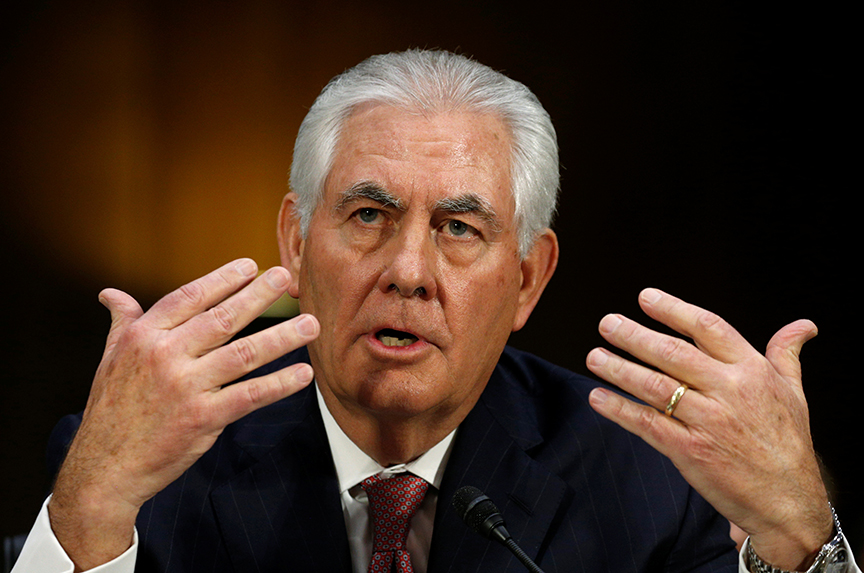 US President-elect Donald Trump’s pick for the job of secretary of state, Rex Tillerson, had his confirmation hearing on January 11. Here are our analysts’ takeaways from that session.
US President-elect Donald Trump’s pick for the job of secretary of state, Rex Tillerson, had his confirmation hearing on January 11. Here are our analysts’ takeaways from that session.
Tillerson Provides a Glimmer of Hope for Ukraine
John E. Herbst, director of the Atlantic Council’s Dinu Patriciu Eurasia Center and a former US ambassador to Ukraine.
Regarding Ukraine, [Rex Tillerson] said that the weak Western response to Moscow’s annexation of Crimea in 2014 had encouraged Russia to launch a military operation in Ukraine’s east. When asked what the United States should have done in response to Russian aggression, he said it should have encouraged Kyiv to deploy all its military assets to the east and should have provided Ukraine with defensive weapons and timely intelligence. Of course, Tillerson’s answer was not about what the United States should do now, but it does open the possibility that the Trump administration may provide more robust support to Ukraine in fighting Kremlin aggression than its timid predecessor.
Read more →
Here’s What Trump Should Keep in Mind as He Seeks a Reset with Russia
Mark Simakovsky, nonresident senior fellow in the Atlantic Council’s Dinu Patriciu Eurasia Center and served as the Russia country director and Europe/NATO chief of staff in the Office of the Secretary of Defense for Policy.
The Trump administration would be well served to strengthen its hand in any upcoming diplomacy with Putin by taking three important steps.
First, expand on the deterrence measures employed over the past two years by bolstering US presence, to include permanent presence, in Eastern Europe and enhancing both the scope and lethality of defensive assistance to our allies and partners. This will help our allies and partners at a time of real threat to their security and highlight the costs associated with destabilizing Europe. Second, the United States should strengthen and, where necessary, expand the sanctions regime against Russia. Elements in the bipartisan legislation introduced this week in Congress that address responding to Russia’s subversion of the US election process are the best place to start. Third, Trump and his team should be cautious in their stated intent to find areas of common interest as the bedrock of strengthened US-Russian ties.
Read more →
Tillerson’s Views on Russia Remain Murky
Alina Polyakova, deputy director of the Dinu Patriciu Eurasia Center and a senior fellow in the Future Europe Initiative at the Atlantic Council.
Tillerson demonstrated that he can take heat and keep a cool head, but after hours of questions the main takeaways are murky. We are left without a clear sense of what the Trump administration’s likely medium- or long-term strategy on Russia will be, if it will continue support for Ukraine, and how it would navigate relations with Russia in the Middle East.
Read more →
Tillerson Could Boost Energy Diplomacy
Agnia Grigas, nonresident senior fellow in the Atlantic Council’s Dinu Patriciu Eurasia Center.
It would have been useful to hear more specifically from Tillerson his views on Russia’s geographic ambitions (presumably to reestablish control over the post-Soviet space) and how he would seek to address the challenge.
Read more →
Rex Tillerson’s Long Day in the Senate
Ariel Cohen, nonresident senior fellow with the Atlantic Council’s Dinu Patriciu Eurasia Center.
Russia did not come across as the United States’ new best friend in Tillerson’s testimony.
Image: Rex Tillerson, the former chairman and chief executive officer of ExxonMobil, testified during a Senate Foreign Relations Committee confirmation hearing in Washington on January 11 to become the next US secretary of state. (Reuters/Kevin Lamarque)
